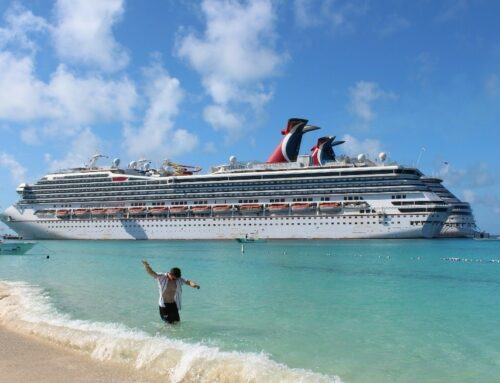Claims for Seamen Under The Jones Act: A Lifeline for Injured Sailors
 If you work on a ship or a boat, you know how dangerous your job can be. Many hazards every day, such as slippery decks, heavy machinery, long hours, and rough weather can get you injured on the job, but you will not be able to just file a workers’ compensation claim like most land-based workers. Instead, you need to rely on a special federal law called the Jones Act to get the compensation you deserve.
If you work on a ship or a boat, you know how dangerous your job can be. Many hazards every day, such as slippery decks, heavy machinery, long hours, and rough weather can get you injured on the job, but you will not be able to just file a workers’ compensation claim like most land-based workers. Instead, you need to rely on a special federal law called the Jones Act to get the compensation you deserve.
What is the Jones Act?
The Jones Act is a law that was passed in 1920 to protect seamen who are injured on the job. A “seaman” is defined as someone who performs a significant amount of their work on a vessel (any kind of ship or boat) in navigation (which means the vessel is afloat, in operation, and capable of moving). This includes roles such as crew member, captain, engineer, cook, and many others.
Longshore workers and employees of shipyards, harbors, and marinas usually do not qualify as “seamen” under the Jones Act. However, these maritime workers are still typically entitled to compensation for work-related injuries under the Longshore and Harbor Workers Compensation Act (LHWCA).
It can be difficult to sort out when and whether “seaman” status might apply to a particular worker, so it is recommended to contact a qualified attorney, such as those at Herd Law Firm, to understand your options after an on-the-job injury. Ultimately, the Jones Act gives those defined as “seamen” the right to sue their employer if their employer or any of their co-workers caused or contributed to their injury.
What Compensation Can Seamen Get Under the Jones Act?
The Jones Act allows seamen to recover damages for their injuries from their employer. Damages are the monetary compensation that a court, judge, or awards to an injured person. Under the Jones Act, seamen can recover damages for:
- Lost earnings and lost earning capacity (past, present, and future)
- Medical expenses (past, present, and future)
- Pain, suffering, and mental anguish (past, present, and future)
The compensation for these kinds of damages can be much more generous than workers’ compensation benefits, which usually only cover a portion of lost wages and medical bills. The Jones Act allows seamen to also recover damages for non-economic losses, like pain and suffering, and workers’ compensation does not.
What Does The Jones Act Do?
The Jones Act provides critical protection to seamen while they perform their job duties, which can present a wide variety of hazards (Note: “seaman” and “seamen” are the terms used under the Jones Act to identify a covered worker, regardless of the worker’s gender identity).
There are two main kinds of claims available to an injured seaman under general maritime law (with additional claims under the Jones Act):
 “Maintenance and cure” provides compensation for a seaman’s daily expenses (maintenance) and necessary medical expenses (cure) after a work-related injury. An injured seaman is almost always automatically entitled to maintenance and cure benefits, regardless of the cause of the injury, and whether anyone’s negligence played a part in it.
“Maintenance and cure” provides compensation for a seaman’s daily expenses (maintenance) and necessary medical expenses (cure) after a work-related injury. An injured seaman is almost always automatically entitled to maintenance and cure benefits, regardless of the cause of the injury, and whether anyone’s negligence played a part in it.- Negligence claims against an employer allow an injured seaman recover for a wider spectrum of accident-related losses, but some level of fault on the part of the employer needs to be shown. Negligence is defined as failing to use reasonable care to maintain safe conditions on the vessel. For example, negligence could be:
- Not providing proper equipment or safety devices
- Not repairing or replacing broken or faulty equipment
- Not training or supervising crew members adequately
- Not following safety rules or regulations
- Not warning of known dangers or hazards
- Not providing adequate medical care or assistance
Unlike workers’ compensation, which pays benefits regardless of fault, the Jones Act requires seamen to prove that their employer was negligent in some way. However, the good news is that the standard of proof is very low under the Jones Act. A seaman only must show that their employer’s negligence played any role, no matter how small, in causing their injury. This is sometimes called the “featherweight” burden of proof.
 How Can Seamen File a Jones Act Claim?
How Can Seamen File a Jones Act Claim?
If you are a seaman who has been injured on the job due to your employer’s negligence, you have the right to file a Jones Act suit against your employer. However, there are some important steps you need to take to protect your rights and maximize your recovery:
- Report your injury to your supervisor as soon as possible, and make sure it is recorded. Although you have up to seven days to do this, the sooner the better. Reporting your injury as soon as possible creates a record of the incident, and prevents your employer from denying it occurred, or minimizing its severity.
- Seek medical attention for your injury as soon as possible. You have the right to choose your own doctor and get the treatment you need. Do not rely on the ship’s doctor or nurse, as they may be biased or influenced by your employer. Be sure to follow your doctor’s advice, and keep all your medical records and bills.
- Contact an experienced Jones Act attorney as soon as possible. An attorney specialized in this kind of law can help you file your claim in either state or federal court, and represent you throughout the process. A Jones Act attorney also can help you gather evidence, negotiate with your employer’s insurance company, even take your case to trial if necessary.
Additionally, a Jones Act attorney can advise whether you have other legal options besides the Jones Act. For example, you may be able to file an “unseaworthiness” claim against the owner of the vessel if your injury was caused by a defect or flaw in the vessel itself. A “maintenance and cure” claim can be filed as well against your employer for basic living expenses and medical care while you recover from your injury.
Why Choose Us as Your Jones Act Attorney?
If you are looking for a Jones Act attorney who can handle your case with skill and compassion, look no further than us. We at the Herd Law Firm represent injured seamen and maritime workers. We know how to navigate the complex laws and regulations that govern maritime injuries and will fight for your rights.
7/25/2023







